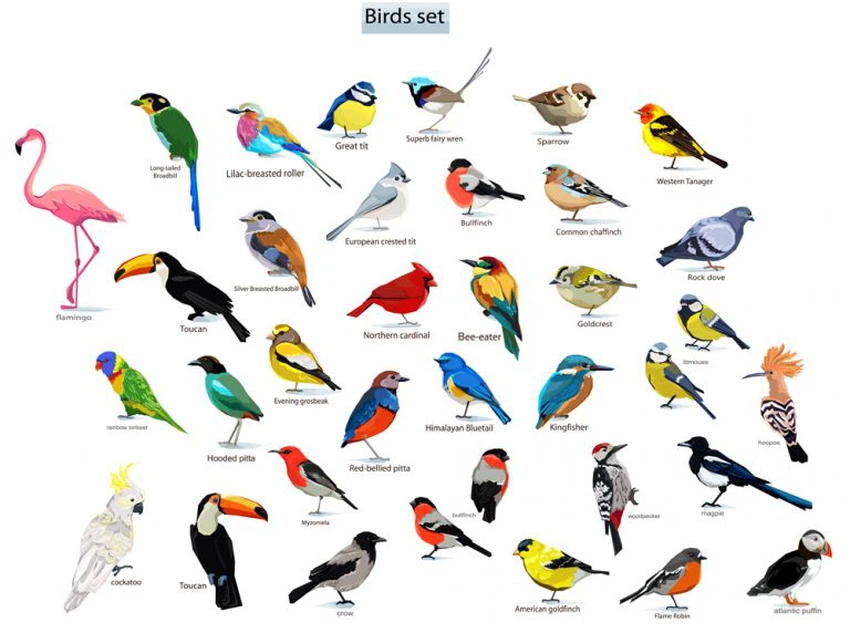Why do birds not have teeth? Was it previously without teeth?
Arab Weather - A bird's beak is a wonderful tool that God Almighty used for these creatures to perform several functions, and birds can have beaks of multiple shapes and sizes, and all of them serve the needs of the bird, whether it is tearing meat, cracking tough nuts, or drinking the nectar of flowers, with the exception of chewing food Because all modern birds have no teeth, but why do birds not have teeth?

Were birds without teeth in the past?
Few early birds used to have teeth, but the mutation eventually disrupted the genes responsible for tooth development, and this genetic mutation evolved with the result that all birds today are toothless. There are several theories as to why birds without teeth were preferred over those that had teeth
Modern birds have been evolutionarily linked to flying dinosaurs, which is a class of dangerous dinosaurs with pointed teeth, however, some of these dinosaurs have gradually evolved into pigeons, ducks, and hummingbirds.
Images of the fossil of Archeopteryx lithographica and a 3D visualization of Archeopteryx lithographica (Image source: Mark Brandon and Spotted Yeti / Shutterstock)
The last bird species of dinosaurs who owned a full set of teeth is Archeopteryx Allithograveka (Archaeopteryx lithographica), who lived about 150 million years ago. However, fossil records of early evolutionary birds, such as " Ichthyornis dispar " that existed in the late Cretaceous period (93-65 million years ago), still show the presence of teeth, as it had a partial beak in front of its mouth and teeth in the back of the mouth, thus It is established that the development of the beak occurred at about the same time as the loss of the teeth.
This indicates that birds lost their teeth about 100 million years ago, but why did birds lose their teeth?
How did the birds lose their teeth?
A research team led by biologists from the University of California, Riverside and Montclair State University revealed that 48 species of birds share mutations that disrupt genes associated with enamel and dentin, enamel is the hard tissue that covers teeth, while dentin is the calcified material underneath.
This discovery means that at some point during evolution, birds have lost the ability to form teeth, resulting in birds appearing without teeth as we see them today.
Interestingly, in 2006, scientists from the University of Manchester and the University of Wisconsin were able to turn back time by giving teeth to young chicks, they overcame mutations that prevent tooth formation by manipulating the chicken's genes so that it could grow teeth, and it reinforced this theory. That the loss of teeth in birds occurred due to the disruption of certain genes over a long evolutionary path. But why did this evolution happen to become toothless birds?
Why did birds lose their teeth?
There are 3 theories in this field that explain why birds lose teeth:
1- One theory indicates that modern birds' lack of teeth was an adaptation to make them lighter in flight , but this theory is scientifically weak, because flying mammals such as bats have teeth and fly lightly.
2- There was an alternative theory that tooth loss was linked to dietary changes . At the end of the Mesozoic era, primitive birds with teeth disappeared in favor of birds with beaks, and it is possible that beaks were simply better for eating bird food than teeth and thus became prevalent.
However, this theory is illogical when you consider the suitability of teeth to different eating habits, as some carnivorous dinosaurs have replaced teeth with beaks, which is another loophole in this theory.
3- Researchers from the University of Bonn in Germany proposed a third and relatively new hypothesis, as they suggested that tooth loss reduces the incubation time of bird eggs and thus was preferred during evolution.
Unlike other egg-laying creatures, such as reptiles and fish, birds lay a relatively small number of large eggs that require a short time to hatch (11-85 days on average). This short incubation period greatly increases their chances of survival, limiting the amount of time the eggs are exposed to environmental factors and predators, resulting in a better number of suitable young birds.
By comparison, research has shown that earlier species of birds - dinosaurs - had eggs that took three to six months to hatch. This long incubation period was attributed to slow tooth formation, as tooth growth was complicated and constituted about 60% of the incubation time for eggs, and the embryos had to wait inside the egg for their teeth to form and only then could they hatch.
Thus, the faster incubation period helped the early birds that made open nests (rather than burying eggs) in the development of these animals, and the time-consuming teeth were sacrificed to allow faster growth of embryos within the eggs, and the shortening of the incubation period reduced the possibility of losing eggs or exposing them to natural disasters. Or disease or predators.
Although this theory appears to be the best so far, researchers agree that it does not explain the lack of teeth in turtles, which still have a long incubation period. We probably won't know for sure why birds lose their teeth, but one thing that has been confirmed is that they were not previously without teeth.
Arabia Weather App
Download the app to receive weather notifications and more..



